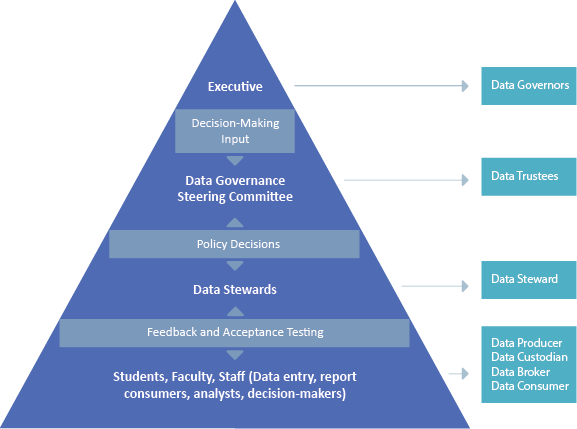Roles and Responsibilities
Several roles and responsibilities govern the management of, access to and accountability for Institutional data. Sponsorship is provided by the University Executive and the Provosts from the Vancouver and Okanagan campuses. The Provosts also provide direction when needed. Data Stewards have direct operational-level responsibility for the management of one or more types of institutional data with authority to make decisions in their area with UBC's interests in mind. Data Stewards will bring recommendations and issues to the Data Governance Steering Committee for enterprise level data. Where the Data Governance Committee needs further direction, matters will be consulted with the Provosts and UBC Executive.

Learn about the different roles and responsibilities:
Data Governors are UBC Executives who are responsible for leveraging data to achieve the university's strategic goals, and policies governing data management.
Data Trustees are institutional officers who have authority over policies and procedures regarding business definitions of data and the access and usage of that data within their delegations of authority.
Under the authority of the Provost, the Data Trustees, through the Data Governance Steering Committee, have responsibility for the strategic guidance of data governance at UBC. The Data Trustees advise UBC Executives on the use of University data. They will work to resolve conflicts and remove barriers related to the development, access, use, collection, or reporting. Through the Data Governance Steering Committee, they issue guidelines or procedures to facilitate improved access, use, integrity, and usefulness of University data.
Data Stewards are University business officials having direct operational-level responsibility for the management of one or more types of Institutional data and have authority to make decisions, but where required, they will escalate decisions to the Data Governance Committee.
Data Stewards are responsible for quality of the data in their domain. Data Stewards serve as a focal point for data governance activity and issue resolution. That includes but it is not limited to working collaboratively with other Data Stewards to define business term definitions, business rules and manage and maintain the data assets for the data within their purview.
Data Producers are people in administrative or academic units that collect or create data during the regular course of their day-to-day activities and responsibilities.
Data Custodians are system administrators responsible for the operation and management of systems and servers that collect, manage and provide access to Institutional data.
Data Brokers are analytics experts who interpret and understand needs of various institutional units for data and supply those needs in custom-requested formats.
Data Consumers are University units or individual University community members who have been granted access to institutional data in order to perform assigned duties or in fulfillment of assigned roles or functions within the University; this access is granted solely for the conduct of University business.
The Data Governance Function facilitates and supports Data Governance and Data Stewardship activities, including:
- keeping track of data stakeholders and Stewards
- providing liaisons to other disciplines and programs, such as data quality, compliance, privacy, security, architecture and IT governance
- collecting and aligning policies, standards and guidelines from these stakeholder groups
- arranging for the providing of information and analysis to IT projects as requested
- facilitating and coordinating data analysis and issue analysis projects
- facilitating and coordinating meetings of Data Stewards
- collecting metrics and success measures and reporting on them to data stakeholders
- providing ongoing stakeholder care in the form of communication, access to information, record keeping and education/support
- articulating the value of data governance and stewardship activities
- providing centralized communications for governance-led and data-related matters
- maintaining governance records
The Data Governance Steering Committee (DGSC) oversees the Data Governance program initiatives for the University of British Columbia. Members of the DGSC are appointed by the Provosts of both campuses, and are accountable to UBC Executives.
The DGSC is a working level, inter-disciplinary group tasked with the responsibility of overarching organizational Data Governance, including changes to existing data processes, policies and standards, resolution of any data issues and change management.
Under the authority of the Provost, the DGSC has responsibility for the strategic guidance of data governance at UBC. The Committee advises UBC Executives on the use of University data. It will work to resolve conflicts and remove barriers related to the development, access, use, collection, or reporting of University data. It may issue guidelines or procedures to facilitate improved access, use, integrity, and usefulness of University data. Data Governors may, at their discretion, ask the DGSC to evaluate data uses that span multiple ownership domains or involve atypical usage arrangements.
The role of the DGSC is to oversees the development and maintainance of University‐wide standards to manage the recording of and access to University data, and to promote a proactive approach to data quality and security.
The DGSC is responsible for the following:
- Approving policies, procedures and guidelines to ensure data consistency, data standardization, data security and data use
- Creating a formal decision-making structure for data standardization
- Providing a two-way mechanism for communicating (e.g. a reporting structure and/or communication plan) about data initiatives across the University
- Creating formal procedures for liaising with data consumers and technical groups for Data Governance projects
- Promoting best practices around data standardization